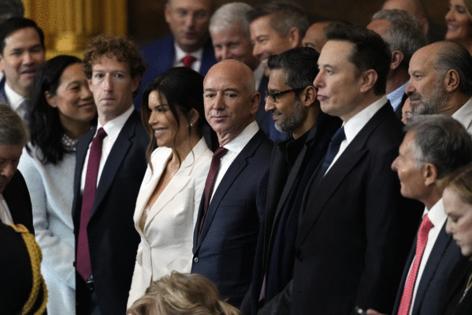Silicon Valley bigwigs bask in Trump limelight in major reversal at inauguration
Published in Business News
Silicon Valley has come a long way.
In suits and ties on the dais behind President Donald Trump during his inauguration speech Monday — inches from the President’s family — sat Meta CEO Mark Zuckerberg, Apple CEO Tim Cook, Sundar Pichai, CEO of Google parent Alphabet, Tesla and SpaceX CEO Elon Musk, and Amazon CEO Jeff Bezos.
It was a scene inconceivable during Trump’s first term, when tech leaders were seen from the political right as a leftist cabal dedicated to spreading liberal propaganda and quashing conservative views. But former President Joe Biden never signaled such an alliance with Big Tech, and his administration launched numerous legal actions over companies’ alleged anti-competitive behavior.
“It does make a significant departure over where they have been over the last four or eight years,” said Sean Randolph, senior director of the Economic Institute at the Bay Area Council, which represents businesses including major tech companies Google, Meta and Apple. “They know where their bread is buttered, or they think they know where it’s buttered.
“These people are running companies and at the end of the day they probably believe that this is in the best interests of their companies and their shareholders’ interests and the bottom line, and that may well be the case.”
Silicon Valley’s relationship reversal with Trump indicates there will be “an active conversation within the administration on technology policy,” Randolph said. “That’s probably a good thing generally speaking for the Bay Area.”
Many firms in Silicon Valley saw Biden administration legal actions against tech giants as “bordering on overreach,” Randolph said.
The CEOs’ presence on the inauguration dais also provided a high-profile departure from the left-leaning politics that had defined Silicon Valley and the tech industry. Musk in March 2024 said he “voted 100% Dem until a few years ago.” Zuckerberg has given to campaigns of politicians on both sides, but his largest donations in the past decade have gone to left-leaning immigration- and criminal justice-reform group FWD.US — $1 million in 2016 — and the San Francisco Democratic Central Committee, $10,000 in 2015, according to campaign-finance monitor OpenSecrets.
Google very publicly led the way on workforce diversity, equity and inclusion (DEI) — a liberal touchstone — and Apple has defended its own DEI initiatives as recently as January.
How Trump will treat the tech industry remains to be seen, but in an executive order Monday he threw out the order Biden issued on artificial intelligence in 2023 as San Francisco company OpenAI’s generative AI was exploding into sudden prominence.
Biden’s AI order sought to mitigate risks from the technology, minimize AI-caused job losses, and ensure AI does not enable discrimination.
The order was not “particularly restrictive” and did not impose “a lot of pre-emptive regulation,” instead directing federal agencies to develop standards and guidelines, Randolph noted.
Menlo Park venture capitalist and former software entrepreneur Shomit Ghose believes Trump’s cancellation of the AI order signals that the AI industry, like the oil-and-gas business, “will see its own equivalent of ‘drill, baby, drill’ … with greatly reduced regulatory constraints.”
That would mean more investment in AI, more growth in AI-focused startups and major tech firms, and more investment in AI computing infrastructure, Ghose said.
“This should be a continuing boost to the Bay Area economy given its leadership position in AI across our companies, research universities and investors,” Ghose said.
Ahmad Thomas, CEO of Silicon Valley Leadership Group, whose membership includes the local tech giants, said that as federal policies evolve under Trump, “collaboration between industry leaders and policymakers remains crucial to ensure that innovation hubs like Silicon Valley continue to develop and scale AI breakthroughs.”
The President also eliminated Biden’s version of the President’s Council of Advisors on Science and Technology, a group launched in 2001 under former President George W. Bush. Under Biden, the 14-member group was largely composed of academics and business executives. Whether Trump replaces the council remains to be seen.
Meanwhile, the President has brought on as advisers conservative and extremely wealthy figures from the Bay Area tech industry, notably Bay Area venture capitalists Marc Andreessen and David Sacks. Musk is heading an advisory body charged with cutting government costs and promoting efficiency.
“There is a cadre of senior technology people in Silicon Valley who are going to have his ear,” Randolph said. “That is in general good for the Bay Area.”
Silicon Valley Central Chamber of Commerce CEO Harbir Bhatia said she would like to see government policies — possibly tax credits, grants and public-private partnerships — that “support small businesses in adopting AI.”
The AI order Trump threw out also instructed the government to consider expanding visa programs for foreign students studying technology, streamlining visa processes for highly skilled tech workers, and enhancing the “integrity and usage” of the controversial H-1B program heavily used by Silicon Valley technology giants and intended for workers with specialized skills.
Randolph noted that most of Trump’s tech advisers have taken public stances in support of skilled immigration that put them at odds with many in the President’s Make America Great Again movement. The Bay Area Council has strongly supported the H-1B.
“We’re going to have to see what happens issue by issue,” Randolph said.
Trump on Tuesday — beside Larry Ellison, chairman of Redwood City software titan Oracle, OpenAI CEO Sam Altman, and SoftBank CEO Masayoshi Son — announced a partnership by the three firms to form a U.S. company called Stargate, which Trump said would invest at least $500 billion in AI infrastructure.The investment would provide a big boost to the Bay Area, “because this is where the leading and the fastest-growing AI companies are,” Randolph said.
©#YR@ MediaNews Group, Inc. Visit at mercurynews.com. Distributed by Tribune Content Agency, LLC.












Comments